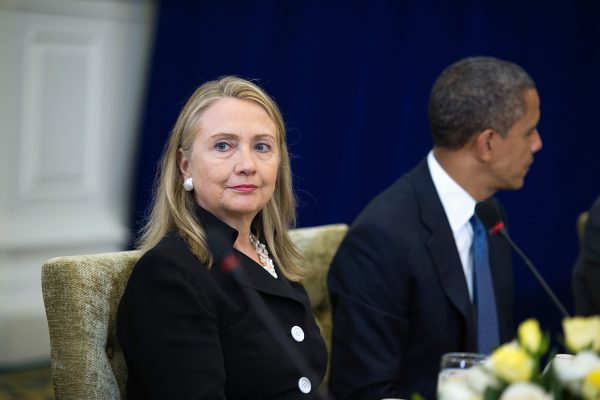
Hillary Clinton is thought to be more hawkish than the man she hopes to succeed, and that reputation is not undeserved, argues Fred Kaplan in Slate
It’s hard to predict just how Clinton would act as president. “The calculations of a senator, or the arguments of a cabinet officer, are different from the deliberations of a commander-in-chief,” writes Kaplan.
But it’s possible to make some deductions based on Clinton’s past.
As Barack Obama’s first-term secretary of state, Clinton sided with Defense Secretary Robert Gates and the generals when discussing troop levels in Afghanistan and supported CIA chief David Petraeus’ plan to arm the supposedly moderate rebels in Syria. Obama overruled her at both times.
When he did support her, to intervene in Libya, it was despite the reluctance of Gates and many in the Pentagon, who didn’t see the uprising against Colonel Muammar Gaddafi as touching on American interests in North Africa.
Balance
Clinton’s hawkishness as secretary of state was balanced by relatively dovish positions on other matters, though, writes Kaplan, including her ill-fated “reset” with Russia.
Even in her support for arming Syrian rebels, Kaplan notes she opposed still more aggressive proposals to deploy American troops.
And while she called for a no-fly zone to protect Syrian civilians, she linked the proposal to consultations with Russia in order to minimize the risks of escalating conflict.
Similarly, in Libya, she advocated an intervention by a coalition of powers, including neighboring Arab states, not by the United States alone.
Toolbox
It’s fair to say then, argues Kaplan, that Clinton is a little more hawkish than Obama but also more cautious than nearly all the Republicans who ran for president this year, including Donald Trump.
“Some Democrats talk about using the military as a last resort,” Kurt Campbell, Clinton’s former assistant secretary of state for East Asian affairs, told Kaplan. “That’s not a natural way for her to think.”
Clinton considers the military one of several tools of national power and her mode of thinking, according to Campbell, involves “welding or integrating all of them together.”
Order
What really separates Clinton from Obama, argues Kaplan, is the former’s discomfort with inaction as opposed to the latter’s recognition of the limits of American power. Obama is reluctant to act for the sake of acting; Clinton’s fear is that inaction creates a vacuum that others will fill.
Both prefer diplomacy over force. Both believe the unilateralism of the George W. Bush years was a mistake. Both, I would add, believe America should shift its attention away from the Middle East and toward the Far East. “Both are lawyers committed to preserving the rules-based order that the United States put in place after 1945,” said Mark Landler, who covers the White House for The New York Times.
This clearly sets them apart from Trump, who has no patience with allies and no interest in preserving the liberal world order America built.
In that sense, Clinton’s hawkishness matters less than her appreciation — unlike Trump’s — of what has kept America prosperous and safe.
